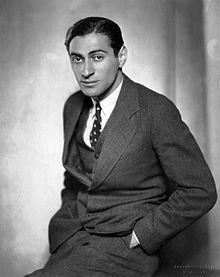Jed Harris
| Jed Harris | |
|---|---|

Jed Harris (1928)
|
|
| Born |
Jacob Hirsch Horowitz February 25, 1900 Vienna, Austria |
| Died | November 15, 1979 (aged 79) New York City, New York |
| Occupation | Theatrical producer, director |
| Years active | 1925–1956 |
Jed Harris (born Jacob Hirsch Horowitz; February 25, 1900 – November 15, 1979) was an Austrian-born American theatrical producer and director. He was responsible for some of the most successful productions on the Broadway stage in the 1920s and 1930s, including Broadway (1926), Coquette (1927), The Royal Family (1927), The Front Page (1928), Uncle Vanya (1930), The Green Bay Tree (1933) and Our Town (1938). He later directed the original Broadway productions of The Heiress (1947) and The Crucible (1953).
Jed Harris was born Jacob Hirsch Horowitz in Vienna, Austria, on February 25, 1900, to Meyer and Esther Schurtz Horowitz. His family moved to the United States in 1901. He attended school in Monmouth County, New Jersey, and entered Yale College at age 17. Although he was studious, he dropped out in 1920, telling a professor, "I'm neither rich enough nor dull-witted enough to endure this awful place."
Harris produced and directed 31 shows between 1925 and 1956. By age 28, he had produced a record four consecutive Broadway hits over the course of 18 months and was on the cover of Time magazine. Over the course of his career, his productions gained seven awards, including a Tony Award and Pulitzer Prize for playwright Thornton Wilder. Harris directed four actors in award-winning roles in Child of Fortune, The Crucible, The Traitor, The Heiress and Our Town.
Described by The New York Times as "a flamboyant man of intermittent charm", Harris was famous for his self-confidence, appeal to women, and sometimes outrageous and abusive behavior. Playwright and director George S. Kaufman, who worked with Harris on The Royal Family (1927) and The Front Page (1928), reportedly hated him and once said, "When I die, I want to be cremated and have my ashes thrown in Jed Harris's face." Although Katharine Hepburn received scathing reviews in the New York production of The Lake (1933) — an experience she later described as "a slow walk to the gallows" — Harris insisted that she and the show go to Chicago. "My dear, the only interest I have in you is the money I can make out of you," Hepburn recalled Harris saying. She extricated herself from the contract by offering Harris all the money she had, $13,675.75; "I'll take it," he said.Laurence Olivier, whom Harris had directed on Broadway in The Green Bay Tree (1933), called him "the most loathsome man I'd ever met." In revenge, Olivier used Harris as the basis for his makeup for his 1944 stage (and later screen) portrayal of Richard III.
...
Wikipedia
